| |
The Buddhists all over the world desire to worship at Lumbini, the birthplace of Sakyamuni, but transportation there is backward. Mr. Xiao Wunan established the Asia Pacific Exchange and Cooperation Foundation, with an aim to reconstruct and develop the three holy sites of Buddhism, where Buddha was born, attained his enlightenment, and delivered his sermons. His effort has received support from the United Nations and the government of Nepal……
On the streets of Katmandu, overlapping the unique harmonious and peaceful atmosphere that permeates in Nepal, a ray of tension emerges because the country is now in the final stages of reforming its constitution. According to the provisional constitution amendment that was passed last July, this May 28th is the deadline for the country to finalize its new constitution. However, a challenge larger than this temporary political confusion is how the Nepalese people can overcome poverty and lead their small nation in the south of the Himalayas into modernization.
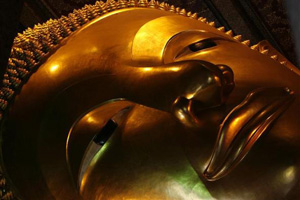
May 10th was designated as the birthday of Buddha after the handover of Hong Kong back to China. However, most people have no idea when Buddha was born. While Nepal is the nation where Shakyamuni was born, it is one of the 48 least developed countries according to the United Nations. Nepal is a country that is rich in culture and natural resources but lacks infrastructure. In Kathmandu, electricity supply usually stops for eight hours every day in summer, and up to fourteen hours in winter. While mobile service is unreliable and transportation system is outdated. For hikers who come from around the world, Nepal is an isolated paradise for excursion and mountaineering. However, for the Nepalese, this so-called paradise is not that perfect.
The Nepalese government is eagerly hoping to improve its economic situation, and Lumbini, a world cultural heritage declared by the UNESCO, is definitely a corner stone in achieving that goal. Although transportation in this region is poor and it is just a village with a population of about fifteen thousand, for the billions of Buddhists around the world, it is indeed an irreplaceable sacred land because Buddha, Shakyamuni was born there. Fifteen years ago, the government of Nepal proposed a development plan for Lumbini with the hope that the development of Lumbini would stimulate the national economy. A Japanese company had even proposed a comprehensive design for the development plans. However, the project was put on hold because of political reasons.
Nevertheless, a new hope is coming out with the global voice of Buddhism Rejuvenation to restart the development of Lumbini. This will also bring new hope to Nepal.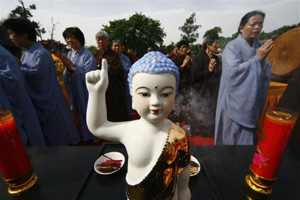
Nepal is located in the South Asian subcontinent and has given birth to many religions. Undoubtedly, Buddhism is one religion that has the most international influence. In the middle of the sixth century BC., the queen of the Kingdom of Kapilani was about to give birth, and because of the tradition, she had to go back to her parents’ home. On the way, she passed by Lumbini and rested under a worry-free tree, where she gave birth to Prince Siddhartha, who was later known as Shakyamuni. Thus Lumbini, the birthplace of Buddha, became the sacred city of Buddhism.
During Buddha’s time, there were many small countries in South Asia. Shakyamuni was born in Lumbini, attained his enlightment at Bodhgaya, delivered his first sermon at Saranath, and achieved nirvana at Kushinagar. According to modern geographic theory, Shakyamuni only spent his life in the middle of India and a small region in southern Nepal. After his death, Buddhism began to spread in all directions in the world, taking root and bearing fruits everywhere. As a result, many regions such as South Asia, Middle Asia, South-east Asia, and East Asia were deeply molded and influenced by Buddhism in their history and culture, with an exuberant vitality even after thousands of years.
Nowadays, many Buddhists hope to worship at the place where the Buddha traveled and lived during his life time. However, because of the local backward transportation and facilities, it is hard for tourists to get there. Therefore, with the voice of Buddhism Rejuvenation, the effort to reconstruct and develop this sacred Buddhist land has caught the attention of a lot of people.
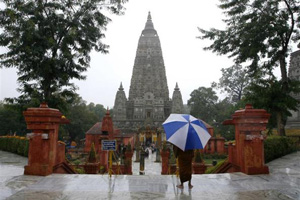 As a devout Buddhist for twenty years, Mr. Xiao Wunan sits in meditation everyday. He always calls for the rejuvenation of Buddhism. In 2010, he established the Asia Pacific Exchange and Cooperation Foundation (APECF). To promote Buddhism is prioritized among the foundation’s objectives. Mr. Xiao Wunan’s vision is that the rejuvenation of Buddhism shall be started by rejuvenating the three Sacred Lands of Buddhism: Lumbini, (birthplace of Buddha), Bodhgaya, (where Buddha attained enlightenment), and Nalanda (the most important place where the Buddha delivered his sermon). He hopes that the necessary restoration and maintenance of these three sacred places, as well as construction of a Buddhism university and Buddhism cultural exchange centers can be achieved. In his view, there is a Vatican for Catholicism and Mecca for Islamism, but no place for a Buddhist pilgrimage in the world. As a devout Buddhist for twenty years, Mr. Xiao Wunan sits in meditation everyday. He always calls for the rejuvenation of Buddhism. In 2010, he established the Asia Pacific Exchange and Cooperation Foundation (APECF). To promote Buddhism is prioritized among the foundation’s objectives. Mr. Xiao Wunan’s vision is that the rejuvenation of Buddhism shall be started by rejuvenating the three Sacred Lands of Buddhism: Lumbini, (birthplace of Buddha), Bodhgaya, (where Buddha attained enlightenment), and Nalanda (the most important place where the Buddha delivered his sermon). He hopes that the necessary restoration and maintenance of these three sacred places, as well as construction of a Buddhism university and Buddhism cultural exchange centers can be achieved. In his view, there is a Vatican for Catholicism and Mecca for Islamism, but no place for a Buddhist pilgrimage in the world.
Mr. Xiao Wunan’s plan is shared by the Nepalese government who also wants to develop Lumbini. Therefore, Mr. Xiao’s idea has been responded positively from the Nepalese government. In the middle of April 2011, Mr. Xiao Wunan led a delegation to Nepal and to carefully survey Lumbini. The delegation exchanged ideas of rejuvenating Lumbini with the Nepalese government and all classes of the country. The effort won constructive consensus. Prachanda, former Prime Minister of Nepal and incumbent President of Maoism (the first major party of Parliament), Bharat Mohan Adhikari, Vice-Prime Minister and Finance Minister, Rajendra Thapa Magar, Vice-Prime Minister and Culture Minister, Bishnu Prasad Paudel, National Defense Minister, and other cabinet members expressed that they would fully support the efforts and work of APECF to rejuvenate Lumbini. On May 6, 2011, on behalf of APECF, Mr. Xiao Wunan signed the framework agreement for the joint development of the Buddhism Special Cultural Zone of Lumbini, Nepal, with the Minister of Ministry of Tourism and Civil Aviation, Khadga Bahadur Bishwakarma.
However, after the world entered the industrial age, Buddhism has gradually started to lose its influence on society. As a universal religion, its rejuvenation cannot be accomplished by only one organization or even one country. Thus, the development of Lumbini requires comprehensive international cooperation.
At the end of April 2011, Mr. Xiao Wunan led a delegation to visit the United Nations, and introduced the details of this plan to the relevant authorities at the UN. Mr.Xiao’s proposal received positive response and tremendous support. The UN also agreed to promote the project under the multilateral framework, and intends to convene an international conference in New York during the period of UN summit on October 5th this year, to initiate the international consultation and dialogue on the development of Lambini.
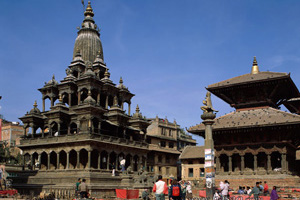
Reconstruction of Nalanda University
Previously, Amartya Sen, the Nobel Economics Prize winner, who was born in India, had been working on the reconstruction of Nalanda University. Nalanda University is known as the most important Buddhism culture center in the history of Buddhism. It was founded in Third Century A.D. and attracted over ten thousand students during its golden age. It is regarded as the best institution for all Buddhists around the world. The most renowned monks in Chinese history such as Xuanzang and Yijing, studied there. In 1193 A.D., the invadingTurks from the north-west ravaged the libraries and temples of Nalanda. As a result, Nalanda University started to decline. To promote the reconstruction of Nalanda University, Amartya Sen organized a team of advisors, which consisted of the Foreign Minister of Singapore Yang Rongwen, the renowned Chinese scholar Wang Genwu, the Special Advisor of the Bureau of World Cultural Heritages Hirayama Ikuo, and professor of Harvard Shygadar Bosh. In October 2010, when Chinese Premier Wen Jiabao visited India, he donated one million US dollars to Nalanda University to support the reconstruction of the school.
A greater difficulty for Buddhism Rejuvenation is that the people of the sacred land of Buddhism have lost touch with the essence of Buddhism. During the age of Monk Xuanzang, Hinduism was prosperous in South Asia. As the Tang Dynasty era book “Journey to the West” described, when Xuanzang made the pilgrimage to Lumbini, he saw the stone pillar erected by Asoka about eight hundred years ago. At that time, it had collapsed because of lightning, and no one could recognize the text written on it. After the twelfth century, Buddhism became even more marginalized. In the late nineteenth century, European archaeologists could only rely on the written records of Chinese monks, such as “Journey to the West” and “Faxian Preach,” to locate the exact positions of important relics of Buddhism, and start their excavation and repairs.
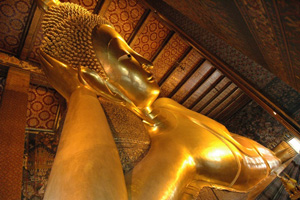
All sorts of plans for Buddhism Rejuvenation, whether it is the development of Lumbini or reconstruction of Nalanda University, will benefit Buddhists all over the world. It is also a great opportunity for a small country like Nepal, with undeveloped economy and status. A Nepalese named Bathory Vlack told Asia Week that there are only two places in Nepal that have great importance to this world. One is the Himalayas and the other is Lumbini. Thus many Nepalese are looking forward to seeing the development of these two places. Only by developing these two places, Nepal can build the necessary infrastructure to solve problems, such as power blackouts, mobile signal blockage and backward transportation.
Khadga Bahadur Bishwakarma, the Minister of Ministry of Tourism and Civil Aviation, said that although Nepal is small in size, it is rich in natural resources. However, due to political reasons and its leaders, Nepal has not developed well in the past. Now the country is at a historical moment, in which Nepal is going to pass its new constitution and its new government seeks to provide new leadership for the 21st century by improving its tourism industry, irrigation facilities, infrastructure and other aspects. So for now, the future of Nepal is filled with hope.
Asia Weekly Li Yongfeng
Correction:
In the twentieth issue of Asia Weekly, The New Hope of Lumbini, birthplace of Buddha, it mentioned that “after Hong Kong’s handover to China, May 10 was designated as the birthday of Buddha”, which is not precise. After years of efforts from Hong Kong Buddhism Joint Association, the Hong Kong Special Administration Region finally designated the birthday of Buddha as a public holiday. According to the tradition of Chinese Buddhism, April 8 of the Chinese Lunar Calendar (it fell on May 10 this year) is designated as the birthday of Buddha.
Editorial Department of Asia Weekly
Back to Top>>
|
|